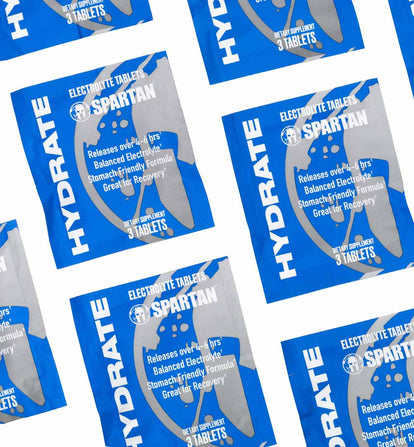How to Perfect Your Pre-Race Nutrition Like a Spartan Pro

The perfect pre-race nutrition starts well before race day. Ideally, you would be consuming healthy, balanced, nutrient-dense meals from the moment you decide to train. Your nutrition, especially in the days leading up to the race, has a major impact on your overall performance and recovery.
Related: Try These 7 Plant-Based Swaps Instead of Animal Protein-Based Meals
What to Eat Leading up to the Race
Carbohydrates
Consume a dinner that is high in carbohydrates on the evenings before your race. Often coined as “carb loading,” higher-carbohydrate meals consumed 1-2 days before an event lasting over 90 minutes — and a Spartan race will certainly top the 90-minute mark — help to saturate liver and muscle glycogen.
When you start your race, stored glycogen will start to break down into glucose for fuel. Reduction of glycogen stores can occur as early as 60 minutes into an intense aerobic workout. This can be a major cause of fatigue, affecting your overall performance. The recommended amount of carbohydrate intake for a race is dependent on the duration of the event. For events lasting under 90 minutes, increasing carbohydrates is likely not necessary. But for endurance events lasting over 90 minutes — and consisting of sustained or intermittent exercise — you should consume about 10-12 grams of carbohydrate per kilogram of body weight (g/kg) each day in the 36-48 hours leading up to the event.
The type of carbohydrate you consume is important, too. Skip the pizza, alcohol, and questionable buffet food. Experiencing gastrointestinal discomfort before or during a race is not fun and will likely affect your performance. Focus on whole-food carbohydrates like sweet potatoes, squash, dried fruit, bananas, and rice.
Protein
Although carbohydrates fulfill an important role, don’t forget about protein. Dietary protein is important for muscle recovery, repair, remodeling, and protein turnover. Protein is also important for non-muscle tissues like tendons and bones.4 Focus on high quality protein sources like grass-fed, grass-finished, organic, and pasture-raised meats. You can also consume protein via protein shakes.
Hydration
Hopefully you have been staying hydrated daily, but now is the time to make sure you are adequately hydrated. Take a good look at the color of your urine. Aim for a lighter yellow color. If yours is darker, drink more water. If you take supplements, especially B vitamins, your urine might look bright yellow or orange in color, so keep that in mind as well.
Pro Tip: Most people do not consume an adequate amount of dietary fiber. Although fiber plays a vital role in cardiovascular, hormonal, and gastrointestinal health, the days leading up to the race are NOT the time to step up your fiber intake. Too much fiber before race day can cause gastrointestinal issues like gas and bloating.
Related: What's the Best Way to Track Nutrition? 5 Tips to Level Up Your Fuel Intake

What to Eat on Race Day (and When to Eat It)
Simplicity is key when it comes to nutrition on race day. Depending on your start time, keep your meal light and focus on easily-digestible carbohydrates to refill your liver glycogen stores. Race day is not the time to start mixing things up or trying something new. Stick to meals that you have thoroughly tested and consumed before. This is a good way to ensure that you won’t have gastrointestinal upset while running your race.
Timing
Timing is everything when it comes to your pre-race meal. For your body to be able to break down and utilize the energy from a large breakfast, you would ideally need to consume the meal at least 3-4 hours before the race. This is not always realistic, since start times are usually early and quality sleep is vital. However, if your race doesn’t start until the afternoon, then you have time to digest a larger breakfast.

Carbohydrates and Protein
If you have time for a larger meal — 3-4 hours before the race, ideally — focus on consuming carbohydrates and some protein. Your carbohydrate intake should be around 1-4 g/kg. Examples of pre-race meals include:
- Oatmeal with nut/oat/low-fat milk and fresh fruit, topped with walnuts or almonds
- Greek yogurt with nuts, fruit, and a piece of toast
- A piece of toast with natural almond or peanut butter, and a banana
As you get closer to the race, smoothies can be an easier way to get in easily-digestible energy. Now is also time to take your pre-workout supplement (if it has passed the tolerance test during your training).
Hydration
Continue hydrating as soon as you wake up. Focus on drinking a cup or two of water, and then continue to take sips throughout the morning. Drinking larger amounts of water at one time will lead to more bathroom trips. Remember to pack along your favorite electrolytes to help regulate the balance of fluids in the body and facilitate muscle contractions.
The Last Word
Perfecting your pre-race nutrition should be part of your overall training program to get the most out of your performance. You do not have to wait until race day to test out your nutrition plan. In fact, you definitely shouldn't wait until then! Sample different meal ideas while you are training to see how well you tolerate each meal and how you feel before, during, and after your exercise to get the most out of race day.





